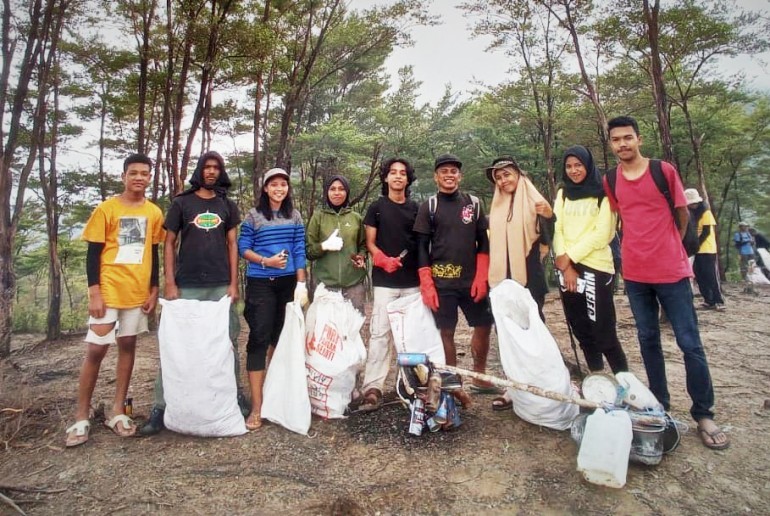Environmentalist Aqul Marasabessy is a member of a group of young Moluccan people who call themselves Kommunitas Peduli Salahutu. They came together again for another event, similar to their Salahutu Clean-up event. This is what he wrote about the second clean-up event last year.
Like the first event, what connected us was our special interest in the trash issue in Maluku. By collaborating, we believed
that we could work together on solving the problem. One of our recommendations was to conduct a
second clean-up, this time in Ala-Ala Buton, Tulehu, a hill near the peak of
Mt. Salahutu, which is also popular among local hikers. An advance group was
sent to survey the area and sadly also found a lot of debris along the trekking
paths. We also looked at potential areas where we could plant new trees, as
the original trees had been cut for firewood.
The event was run over two days. The field team was
first sent out on 26th September 2020 to prepare everything, which
included digging holes and marking each tree planting spot, building shelters
near rest points, and transporting the plants as well as the cleaning
equipment. The next day at 06.00 am, all the participants met at the entrance,
each of them carried one plant and a trash bag. The planting was done all along
the trail right up to the summit, which was a 3-hour hike from the entrance. They
had a break at the top to enjoy the amazing scenery and views and took a photo
group. On the way down they picked up the trash and weighed it before it was transported
to the landfill in Ambon. The transportation was provided and facilitated by
the Head of Tulehu Village.
Altogether 90 volunteers from 30 different environmental
communities were involved in the activity. They had planted 65 linggua trees (Pterocarpus
indicus) and brought down a total of 127kg of trash. This total is
surprising because it is larger than that in the previous project, when a total
of 100kg was collected from Salahutu, a far more popular mountain. Interestingly,
this time the trash collected was more varied, it included a lot of discarded camping
gear, like cooking sets and even tents. The findings of such a large amount of trash
on Ala-Ala Buton, made them question why people would dump it all on the
mountain. Afif Ohorella the field coordinator said: “As a hiker, we everyone
has to know the rules. Do not leave anything except footprints. People have to
bring back their trash when they are camping on the mountain.”
Our Peduli Salahutu team wanted to know why loads
of waste was left on the mountain as most hikers knew that they were responsible
for their own waste. We decided that the best approach would be to address the
trash problem on these mountains, other than just organising regular annual mountain
clean-up events. We wanted to understand the behaviour of certain groups
towards their waste when they are doing their activity in nature and wanted to come
up with a solution to the problem.
Sadly, we had concluded, that even some from the
mountaineering community lack a basic understanding of the incessant trash
issue. Most of these groups needed to be (re)educated so they would recognize
the difference between organic and non-organic waste and what they should do
with their own trash. Perhaps enforce stricter guidelines and maybe even impose
fines when necessary. It’s going to be a slow process, but let’s hope it’s not going to be too late.


11_105_90.jpg)




_105_90.png)